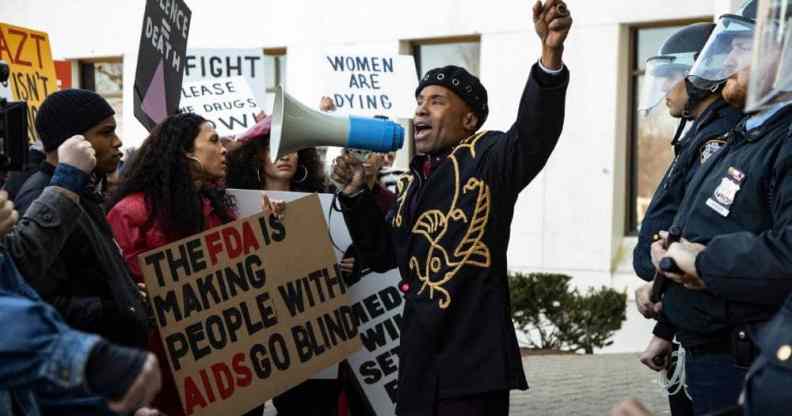Heartbreaking Pose finale recreated one of the most powerful protests in history

Pray Tell (Billy Porter) joins ACT UP to protest the lack of accessible medication for people diagnosed with HIV and AIDS in the final episode of groundbreaking series Pose. (FX)
The series finale of Pose ended on an emotional note by recreating one of the most powerful protests in history against the US government’s inadequate response to the AIDS epidemic.
The groundbreaking drama came to a close Sunday night (6 June) tearful goodbyes, new beginnings and one final history lesson.
With much of the season revolving around the fight for accessibly HIV medication, the final episode saw Pray Tell (Billy Porter) make the ultimate sacrifice – giving his medication to an oblivious Ricky (Dyllón Burnside), with the decision leading to his death.
Moving scenes saw the remaining characters, led by Blanca Rodriguez-Evangelista (MJ Rodriguez), join an ACT UP protest against the gatekeeping of anti-retroviral drugs, spreading the ashes of loved ones (including Pray) on the New York City Mayor’s lawn.
The protest mirrored real-life ACT UP demonstrations which saw activists scatter the ashes of people who had died with AIDS on the White House lawn. Demonstrators held two Ashes Actions in October 1992 and October 1996 to protest of the federal government’s feeble response to the AIDS epidemic.
Vice reported the action was inspired by David Robinson, who had planned to fulfil the last wish of his partner, Warren, by sending his ashes to then-president George HW Bush along with a protest letter.
Robinson was also reportedly inspired by David Wojnarowicz’s memoir Close to the Knives. Wojnarowicz’s book described what it would be like if “each time” a person died of “this disease” that their “friends, lovers or neighbours” would take the “dead body” and “dump their lifeless form on the front steps” of the White House.
ACT UP invited anyone across the US who possessed the ashes of a loved one who died from AIDS to join them in their protests. Wojnarowicz’s ashes were even scattered on the White House lawn during the 1996 Ashes Action.
Robinson later told Vice it was important that the group “weren’t going to do anything symbolic” when it came to the Ashes Actions. He explained: “The point was these are actual ashes. This is the literal physical representation of the Bush administration’s AIDS policies.”
Both actions were also timed to coincide with displays of the AIDS Memorial Quilt – which plays a part in Pose’s final season – and before presidential elections. The quilt is a memorial to and celebration of the lives of people lost to the AIDS epidemic. By 1992, the quilt included panels memorialising people from every state and 28 countries. The last display of the quilt was in October 1996, when the second Ashes Action occurred.
The final episode of Pose showcased all that was great about the groundbreaking series: the beloved characters, gorgeous costumes and emotive storylines. At one point, Pray Tell and Blanca even performed a wonderful lip sync to Diana Ross’ “Ain’t No Mountain High Enough”.
The final episode opens with Pray admitting himself to hospital and telling Blanca that he wants to finish his panel for the AIDS quilt with her before he dies. Blanca, who works at the hospital, discovers that there is a trial of a new experimental treatment meant to stop HIV from attacking the rest of a person’s immune system. After fighting for their places, Pray and Blanca are able to get spots on the clinical trial and see improvements in their health.
But Pray passes away in a heartbreaking fashion after it is revealed that he gave his lifesaving medicine to Ricky (Dyllón Burnside), whose health had been in decline during the Pose finale.
Pose co-creator and showrunner Steven Canals told Deadline that the “conversations” around a character “dying because of their HIV/AIDS diagnosis” began in the show’s second season. He explained the reason for such discussions “had everything to do with growing the show in truth and in reality”.
Canal explained that Pray’s “sacrifice” in the last episode of Pose was also about “showing our deep connections to one another” in the LGBT+ community.
“We as queer and trans people, as Black and Brown people, have always had to show up for each other, which is ultimately what Pray Tell’s sacrifice for Ricky is all about,” Canal said. “It’s as much about HIV/AIDS and how HIV impacted the community and eviscerated the community, as much as it is about how we, as queer and trans people of colour, are constantly having to show up for one another.”

